The Colon Cleanse Diet refers to a detoxification method that aims to remove waste and toxins from the colon, though it lacks scientific evidence to support its health benefits. This diet often involves the use of enemas, herbal supplements, or special laxatives, but it comes with risks such as cramping, bloating, diarrhea, and electrolyte imbalances.
What is the Colon Cleanse Diet?
The Colon Cleanse Diet is a diet plan that focuses on promoting colon health and detoxification through specific foods and beverages. It involves incorporating high-fiber foods like fruits, vegetables, whole grains, and legumes into your daily meals.
These foods help regulate bowel movements and support a healthy digestive system. The diet also emphasizes the intake of liquids such as water, herbal teas, and fresh juices to flush out waste and keep the colon hydrated. By following a gentle colon cleanse diet, you can support your colon’s natural detoxification process and improve your overall health and well-being.
How does the Colon Cleanse Diet work?
The Colon Cleanse Diet works by aiming to detoxify the colon through the consumption of specific foods and homemade drinks designed to cleanse the colon.
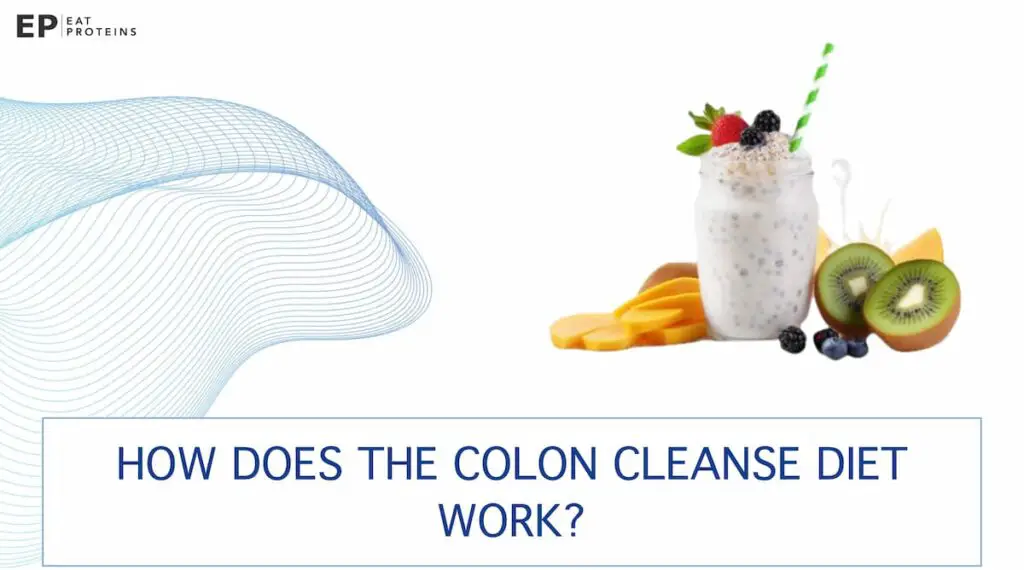
The primary objective of this diet is to remove waste build-up from the colon walls, with the belief that this will improve nutrient absorption, and digestion, and potentially contribute to weight loss.
Additionally, the diet claims to boost immunity and energy levels by maintaining a clean colon. According to the University of South Alabama College of Medicine, adequate colon cleansing is crucial for reliable diagnostic and surgical procedures on the colon. Various methods, including laxatives, cathartics, and enemas, are used in medical settings to ensure the colon is well-prepared for procedures.
However, the efficacy and safety of colon cleansing for general well-being outside of medical procedures are not well-supported by scientific evidence.
How does a Colon Cleanse Diet aid in weight loss?
A colon cleanse diet is often believed to aid in weight loss, but there is limited scientific evidence to support this claim. According to a 2006 study by Steven Horne from the American Herbalists Guild, the concept of cleansing the colon is more metaphorical and aims to improve detoxification and reduce inflammation in the gastrointestinal tract.
However, the study also points out that the traditional explanations used to promote these therapies are not grounded in scientific fact. Any weight loss that occurs during a colon cleanse diet is likely due to water loss and a temporary reduction in food consumption, rather than actual fat loss.
What are the benefits of the Colon Cleanse Diet?
The benefits of the Colon Cleanse Diet include improved digestion, potential weight loss, detoxification, enhanced energy levels, and a boosted immune system.
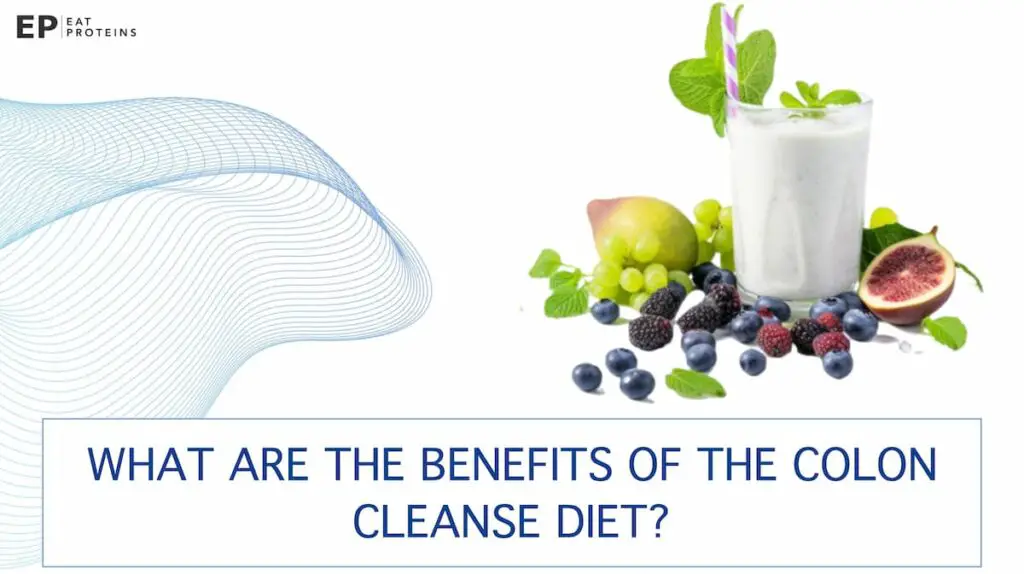
- Improved Digestion: Promotes regular bowel movements and prevents constipation by incorporating high-fiber foods.
- Weight Loss: Encourages consumption of nutrient-dense foods while reducing processed options.
- Detoxification: Aids in the removal of toxins and waste materials from the colon.
- Enhanced Energy: Nourishes the body with healthy, natural foods to boost energy levels.
- Boosted Immune System: Provides essential vitamins and minerals that can strengthen the immune system.
How does a Colon Cleanse Diet impact bowel movements?
The colon cleanse diet is designed to positively impact bowel movements by increasing fiber intake, which promotes regularity and prevents constipation. According to a 2009 study by Ruben D Acosta from the National Naval Medical Center, there is no rigorous scientific evidence to support the general health promotion claims of colonic cleansing.
However, the high fiber content in foods recommended for a colon cleanse can improve digestion by reducing issues like bloating and gas. The diet also claims to aid in detoxification by removing waste and toxins, which can lead to healthier bowel movements. Overall, while the scientific support is limited, incorporating a colon cleanse diet can result in more frequent and healthier bowel movements.
How to Start the Colon Cleanse Diet?
To start the colon cleanse diet, consult with a healthcare provider for personalized advice and to ensure it’s appropriate for you.
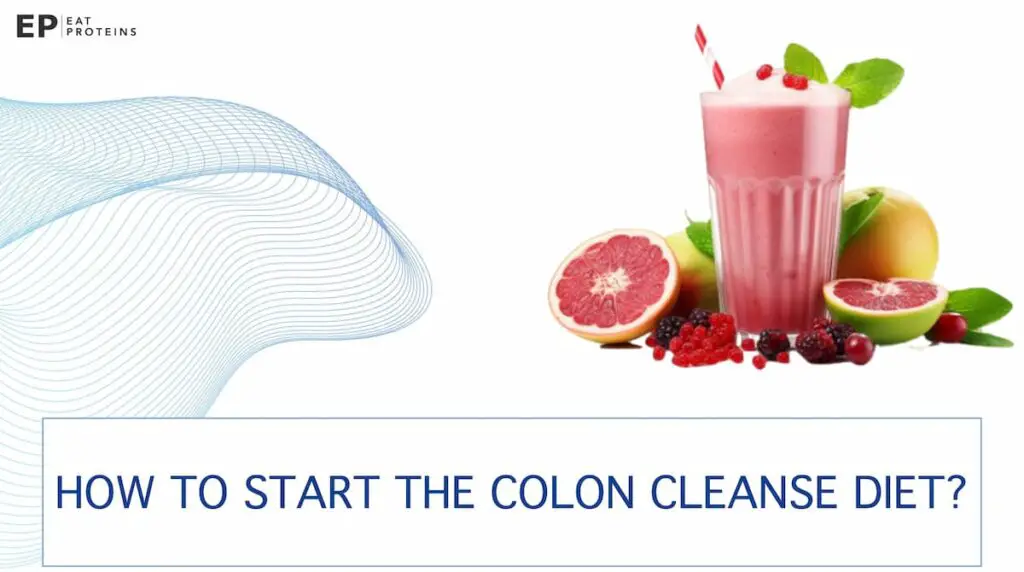
- Speak with a healthcare provider to determine if the colon cleanse diet is suitable for you, especially if you have underlying health conditions or are taking medications.
- Gradually increase your daily fiber intake to 25-30 grams, incorporating fiber-rich foods like fruits, vegetables, whole grains, and legumes.
- Stay hydrated by drinking at least 8 cups (64 ounces) of water per day, along with herbal teas.
- Consider incorporating herbal supplements that aid digestion, but consult your healthcare provider first.
- Include probiotic-rich foods like yogurt or take a probiotic supplement to improve gut health.
- Decide on the length of your colon cleanse diet, which can vary from a few days to several weeks.
- Some versions of the colon cleanse diet include fasting periods; consult with your healthcare provider before attempting this.
- Opt for organic fruits and vegetables to minimize pesticide and toxin intake.
- Be aware of possible side effects like dehydration and nutrient deficiencies, and take appropriate precautions.
What are the components of a 3-day Colon Cleanse Diet?
The key components of a 3-day colon cleanse diet include:
- High Fiber Foods: Incorporate plenty of fruits, vegetables, and whole grains into your meals. These foods contain fiber, which aids in healthy digestion and natural colon cleansing.
- Hydration: It is important to drink an adequate amount of water throughout the day. Staying hydrated helps regulate digestion and supports the elimination of waste from the body.
- Probiotics: Include foods rich in probiotics, such as yogurt, kefir, and sauerkraut. Probiotics contribute to a healthy gut microbiome and overall colon health.
What foods are included in a Colon Cleanse Diet plan?
The following foods are included in a colon cleanse diet plan:
- Fiber-rich fruits: Apples, pears, and berries are examples of fruits that are high in fiber. These fruits help add bulk to your stool and promote regular bowel movements.
- Leafy green vegetables: Spinach, kale, and Swiss chard are examples of leafy green vegetables that are packed with fiber and other nutrients. They support a healthy colon and aid in the cleansing process.
- Whole grains: Quinoa, brown rice, and whole wheat bread are examples of whole-grain foods that are rich in fiber. They provide essential nutrients and contribute to a well-rounded colon-cleanse diet plan.
Including these fiber-rich fruits, vegetables, and whole grains in your colon cleanse diet plan will support healthy digestion and promote a clean colon.
What foods should you avoid on the Colon Cleanse Diet?
On the Colon Cleanse Diet, it’s crucial to avoid processed foods, sugary beverages, and foods high in unhealthy fats and sodium.
- Processed Meats: Sausages, hot dogs, deli meats
- Sugary Beverages: Sodas, fruit juices with added sugar, energy drinks
- Fast Food: Burgers, fries, deep-fried items
- Packaged Snacks: Chips, cookies, candy bars
- Refined Grains: White bread, white pasta, white rice
- High-Sodium Foods: Canned soups, packaged ramen, salted nuts
- Artificial Sweeteners: Aspartame, sucralose, saccharin
- Preservatives: Foods with long shelf lives like canned goods
- High-Fat Dairy: Full-fat cheese, cream, butter
What herbs are commonly used in a Colon Cleanse Diet?
The three commonly used herbs in a colon cleanse diet are Psyllium Husk, Ginger, and Peppermint. Including these herbs in your colon cleanse diet can enhance the cleansing process and promote a healthy digestive system.
- Psyllium Husk is rich in fiber and helps to soften stool, promote regular bowel movements, and cleanse the colon by removing waste and toxins.
- Ginger has anti-inflammatory properties that soothe the digestive system, reduce bloating and gas, stimulate digestion, and aid in the elimination of toxins.
- Peppermint has a calming effect on the digestive system, relieving symptoms such as indigestion, bloating, and cramps. It also supports healthy bowel movements and reduces inflammation.
What are the recommended portion sizes in a Colon Cleanse Diet?
The recommended portion sizes in a colon cleanse diet are as follows:
- Fruits: 1 cup
- Vegetables: 1 cup
- Whole Grains: 1/2 cup
- Lean Proteins: 3-4 ounces
These portion sizes are important to ensure a balanced intake of nutrients while supporting the cleansing process. It’s crucial to listen to your body’s hunger and fullness cues and adjust portion sizes accordingly. For personalized guidance on portion sizes and meal planning for a colon cleanse diet, book an appointment with Eat Proteins online nutrition coaching consultant.
What is the 7-day Colon Cleanse Diet meal plan?
The 7-day Colon Cleanse Diet meal plan focuses on fiber-rich foods, hydration, and natural detoxifying elements to improve digestive health.
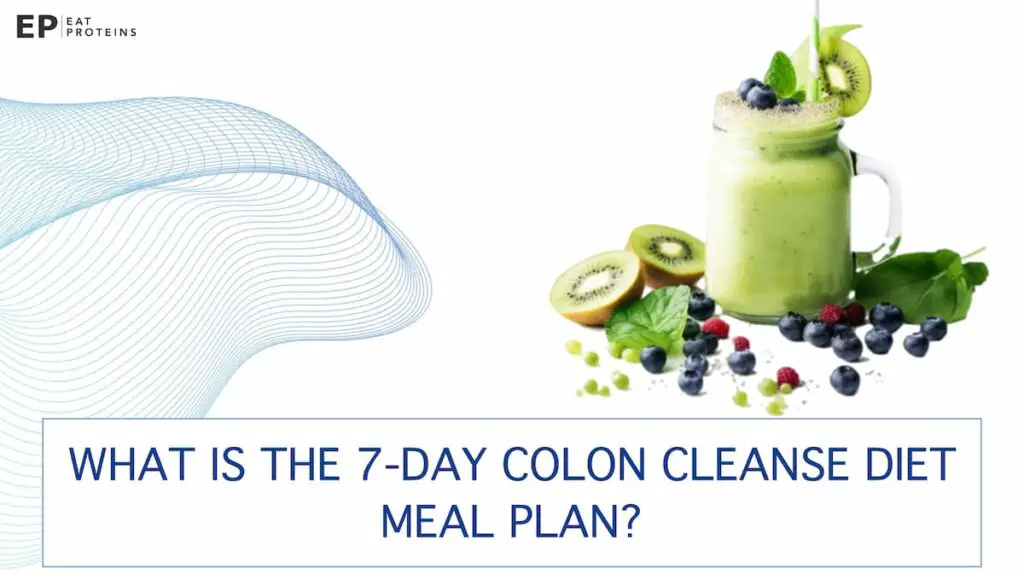
Day 1
- Breakfast: Fruit smoothie with chia seeds
- Lunch: Lentil soup and green salad
- Dinner: Grilled vegetables and quinoa
Day 2
- Breakfast: Overnight oats with berries
- Lunch: Vegetable stir-fry with brown rice
- Dinner: Baked sweet potato and steamed asparagus
Day 3
- Breakfast: Avocado toast on whole-grain bread
- Lunch: Chickpea salad
- Dinner: Vegetable curry with cauliflower rice
Day 4
- Breakfast: Green smoothie (spinach, banana, and almond milk)
- Lunch: Vegetable soup with whole-grain roll
- Dinner: Zucchini noodles with tomato sauce
Day 5
- Breakfast: Chia pudding with sliced almonds and berries
- Lunch: Quinoa salad with mixed veggies
- Dinner: Grilled fish with a side of steamed broccoli
Day 6
- Breakfast: Fresh fruit salad
- Lunch: Black bean tacos on corn tortillas
- Dinner: Stuffed bell peppers
Day 7
- Breakfast: Yogurt with granola and honey
- Lunch: Lentil and vegetable stew
- Dinner: Baked chicken with a side of green beans
What are some recipes for a Colon Cleanse Diet?
Here are three recipes for a colon cleanse diet:
1. Colon Cleanse Diet Smoothie
- Ingredients: 1 cup spinach, 1 cup kale, 1/2 cucumber, 1 cup coconut water.
- Instructions: Blend all the ingredients together until smooth. You can add ice cubes for a refreshing taste. This smoothie is high in fiber and water content, which can help cleanse your colon.
2. Colon Cleanse Diet Refreshing Salad
- Ingredients: 2 cups mixed greens, 1 grated carrot, 1 grated beet, lemon detox dressing.
- Instructions: In a large bowl, combine the mixed greens, grated carrot, and grated beet. Drizzle the salad with a lemon detox dressing, which can be made by mixing lemon juice, olive oil, a pinch of salt, and a dash of honey. This salad is rich in fiber and nutrients, promoting a healthy colon.
3. Colon Cleanse Diet Grilled Salmon with Steamed Vegetables and Quinoa
- Ingredients: 1 salmon fillet, 1 cup steamed vegetables (such as broccoli, cauliflower, and carrots), 1/2 cup cooked quinoa.
- Instructions: Season the salmon fillet with salt, pepper, and your preferred herbs. Grill the salmon until cooked through. Serve the grilled salmon with a side of steamed vegetables and cooked quinoa. This meal is light, nourishing, and provides essential nutrients for your colon health.
What is the science behind the Colon Cleanse Diet?
The science behind the Colon Cleanse Diet is not well-supported by scientific evidence. While the concept of cleansing the colon has gained popularity, there is limited scientific research to back up its effectiveness.
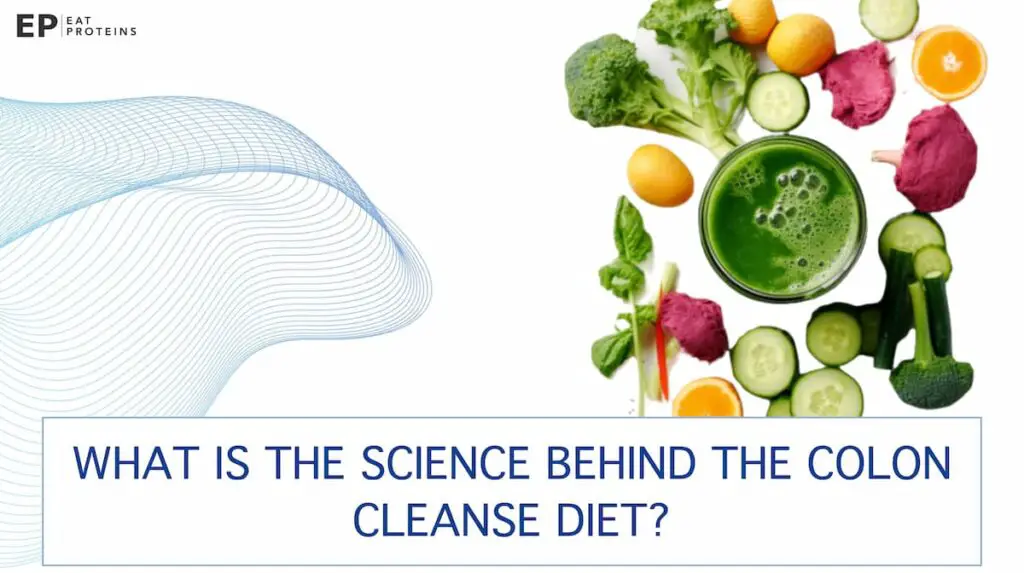
How does a Colon Cleanse Diet interact with medications?
A colon cleanse diet can potentially interact with medications. Changes in the digestive system and nutrient absorption caused by a colon cleanse diet can affect the effectiveness of certain medications.
How often should one do a Colon Cleanse Diet?
The colon cleanse diet should not be done more than once every 3 to 6 months, based on available evidence and expert recommendations. Overdoing it can disrupt the natural balance of your digestive system and lead to potential complications. It is important to give your body enough time to recover and maintain its normal functioning.
Can you purchase a Colon Cleanse Diet from Walmart?
Yes, you can purchase a Colon Cleanse Diet from Walmart. Walmart offers a variety of products that can assist you in your cleansing journey. They have a range of meal plans, supplements, and detox kits designed to support your colon cleanse.
What are the alternative Diet Plans to a Colon Cleanse Diet?
If you’re not interested in a colon cleanse diet, there are alternative diet plans available. Here are three options to consider:
- Mediterranean Diet: This diet focuses on consuming whole foods, such as fruits, vegetables, whole grains, legumes, lean proteins, and healthy fats like olive oil. It has been associated with numerous health benefits, including reduced risk of heart disease and improved cognitive function. Studies have shown that following the Mediterranean diet can reduce the risk of heart disease by up to 30% and lower the risk of stroke by 33%.
- DASH Diet: The Dietary Approaches to Stop Hypertension (DASH) diet is designed to lower blood pressure. It emphasizes fruits, vegetables, whole grains, lean proteins, and low-fat dairy products. It also encourages limiting sodium, saturated fats, and added sugars. Research has shown that following the DASH diet can significantly lower blood pressure, with reductions of up to 11 mm Hg in systolic blood pressure and 6 mm Hg in diastolic blood pressure.
- Plant-Based Diet: A plant-based diet primarily consists of plant foods, such as fruits, vegetables, whole grains, legumes, nuts, and seeds. It can provide essential nutrients while reducing the intake of animal products, which may have health benefits like lower risk of chronic diseases and weight management. Studies have shown that following a plant-based diet can reduce the risk of developing type 2 diabetes by up to 50% and lower the risk of heart disease by up to 42%.
How does the Colon Cleanse Diet compare to the Lemon Detox Diet?
The colon cleanse diet and the lemon detox diet have some key differences in terms of their effects on the body. The colon cleanse diet focuses on consuming high-fiber foods such as fruits, vegetables, and whole grains. On the other hand, the lemon detox diet involves drinking a lemonade mixture made of lemon juice, maple syrup, cayenne pepper, and water.
How does garcinia cambogia interact with a Colon Cleanse Diet?
When incorporating garcinia cambogia into a colon cleanse diet, there is limited scientific evidence to support any significant interaction between the two. While garcinia cambogia is often used as a weight loss supplement, its specific interaction with a colon cleanse diet is not well-established.
How does Dr. Oz recommend doing a colon cleanse diet?
Dr. Oz recommends a 48-hour colon cleanse diet that involves eating nutrient-rich foods to support detoxification and healthy elimination. The meal plan consists of the following:
- Breakfast: Quinoa with Prunes – This provides fiber, and protein, and supports bowel movements.
- Lunch: Revitalizing Fruit Smoothie – This contains antioxidants, and fiber, and supports detoxification.
- Dinner: Vegetable Broth with Sauerkraut and Sliced Apples – This supports liver function and provides fiber for elimination.
- Snack: Pineapple-Kale Juice – This contains digestive enzymes and supports detoxification.
